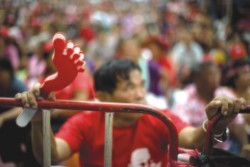|
Neighbours
Time the red leaders bite the bullet
Avudh Panananda

Unless the red shirts voluntarily end their rally this week, the prospects of holding fresh elections this year or the next remain grim indeed.The power struggle has, unfortunately, plunged Thailand into its darkest chapter. And the animosity keeps on festering simply because the rival camps do not have the will nor the courage to sacrifice their petty interests for the sake of the greater good.
If the stand-off between the government and the red shirts is allowed to persist, then a worrisome scenario may emerge and even gain momentum. Under the scenario, the government will keep trying to bring about reconciliation. However, as long as the fence-mending process stays incomplete, elections will be delayed. Contrary to the popular notion of a military coup, power seizure can also be spearheaded by civilians.
Without the balloting, there would be no democratic alternative to hear the voice of the people. The peaceful transition of power, a key hallmark of democracy, hinges on votes. All sectors of society should come to their senses before having to endure the farcical effect of their own actions - trying to advance democracy but destroying the democratic rule instead.
After nearly two months of relentless protests, the government has offered the red shirts a road map for reconciliation. The key proposal is holding fresh elections by November 14 in exchange for ending the rally at Rajprasong.
However, a week has passed since the offer was made, but there is no definitive answer as to when the red shirts will disperse. This is despite the fact that the reds have endorsed the reconciliation plans.
The road map has ironically triggered a fiery debate, with the poll date becoming a contentious issue driving a wedge instead of fostering reconciliation. In the pro-government camp, the yellow and the multicoloured shirts are belligerently opposing what they believe is a shameful deal with the "terrorists".
Thai Prime Minister Abhisit Vejjajiva is caught in an awkward position, on the one hand he cannot pacify his foes, and on the other, he has managed to antagonise his friends.
In the red-shirt camp, core leaders like Veera Musigapong, Jatuporn Promphan, Natthawut Saikua and Weng Tojirakarn also find themselves caught in their own trap.
In order to mobilise the crowds, the core leaders churned out unrealistically high expectations. Now they are having a difficult time convincing the red shirts to accept real politicking without being seen as traitors to the opposition movement.
To a vast majority of the red shirts from the rural Northeast, the most logical outcome would be an immediate dissolution of Parliament. According to their belief, which was previously reinforced by their core leaders, they are exercising their democratic right to bring down what they see is an illegitimate government.
While red shirts from urban areas might understand the necessity for making deals, their counterparts from remote villages are worlds apart in their idealistic view. The rural reds find it unacceptable to disperse before the House is dissolved. In addition, none of the red-shirt leaders, or their puppet masters such as ex-PM Thaksin Shinawatra and Pheu Thai Party chairman Chavalit Yongchaiyudh, have the guts to explain the political reality for fear of invoking voters' wrath.
It is nonsense to expect the government to reach out and reason with rural red shirts, because they don't pay attention to state media outlets anyway. If the red leaders are true advocates of democracy, as they insist they are, then they should bite the bullet and convince the rural reds why they should disperse.
Delaying ploys, such as counter offers for the road map and talks on the terms of surrender, will lead nowhere but cause untold damage to democracy.
The Nation, Thailand.
Copyright
(R) thedailystar.net 2010
|

